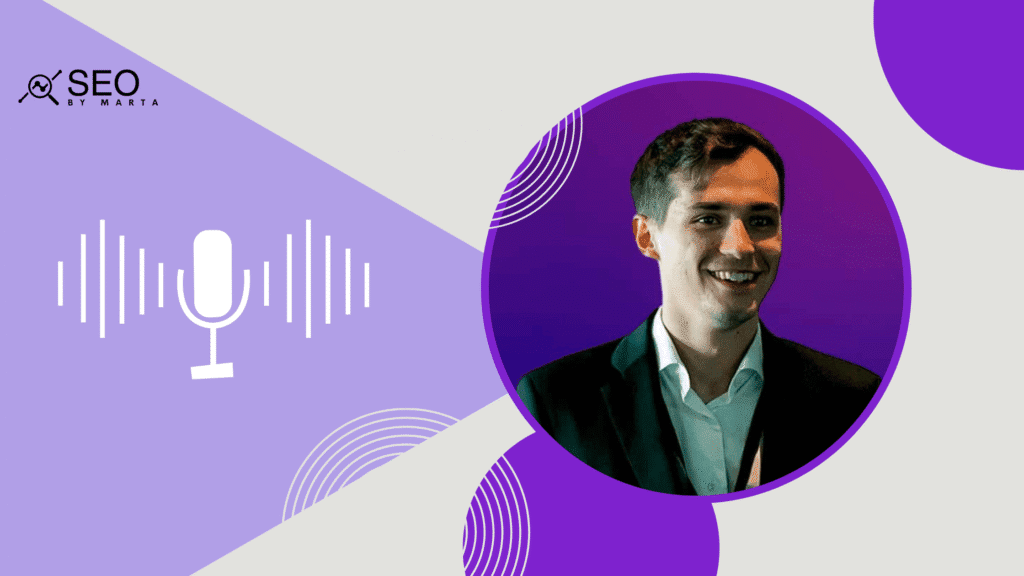About Michał Suski
Michał Suski is a Polish digital marketer, international speaker, and co-founder of SurferSEO. Since launching the platform in 2017, he has been instrumental in transforming it from a pioneering on-page SEO tool into a widely used AI-powered content optimization platform. Today, SurferSEO helps businesses across the globe improve their organic search results through data-driven insights. Michał has dedicated his career to advancing SEO technology and sharing his expertise by training marketers on how to effectively combine AI with smart on-page strategies.
About SurferSEO
SurferSEO is the AI Search Optimization (AI SEO) platform. It provides you with a single workflow to ensure your content is visible across Google, ChatGPT, and other AI search engines. With Surfer, you can plan, write, and optimize content that ranks and gets found in the new era of search.
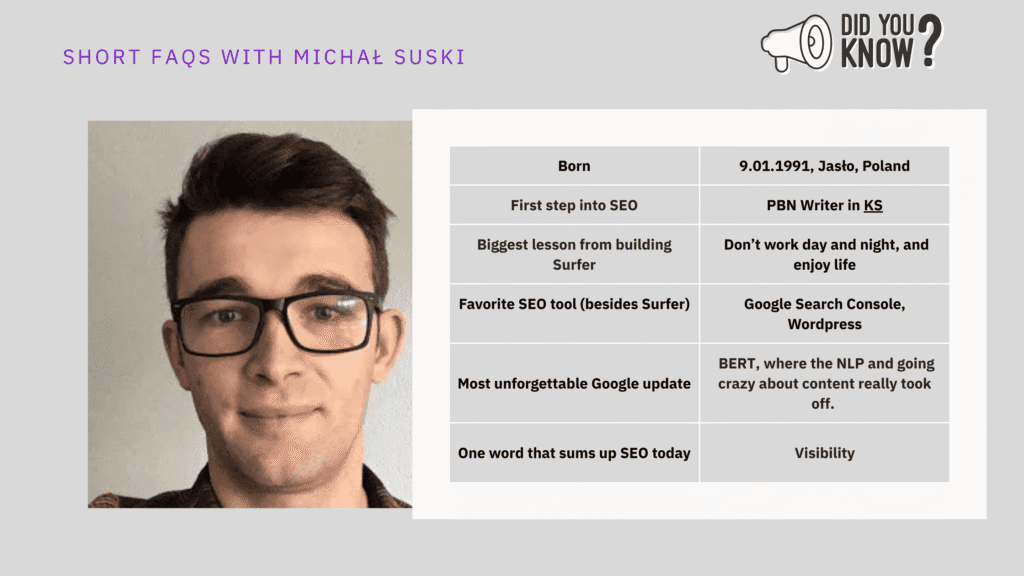
Interview -How AI is Changing the Way SEOs approach content creation
Michał Suski’s deep expertise in AI-powered content optimization and on-page SEO has helped thousands of marketers rethink the way they approach content creation. He has been at the forefront of building a tool that combines data, automation, and machine learning to make content both user-focused and search-friendly. Michał’s story isn’t just one of startup success. It’s about transforming challenges into new possibilities, questioning easy answers, and constantly pushing the envelope for what SEO technology and strategy can achieve. He regularly shares his insights at conferences and through thought leadership, shaping how SEOs adopt AI responsibly in their workflows.
In this interview, Michał discusses AI-Powered Content Optimization — how artificial intelligence is changing the way SEOs approach content creation, what misconceptions to avoid, and what the future of content looks like in an AI-driven search landscape.
Q: Hi Michal, thank you for agreeing to this interview. Many SEOs still see AI tools like SurferSEO as a “shortcut” to generate content. In your view, what’s the biggest misconception about AI tools in SEO right now?
A: The amount of work that needs to be done before writing is massive. Humans just can’t do this. AI is not a shortcut; it is an extension. It brings new possibilities on how much data can be analyzed. Even a subject matter expert have limited database space in their head. Context window, follow-up prompts and data organization make it almost impossible to overfeed. This way AI writer can reach levels of understanding that are not in reach of most people. Of course, there are above-average folks who know more and do it better, but the level available for a regular writer with AI doing the data extraction and drafting within minutes is insane.
What is a shortcut, then? One-off Chat GPT request for an article about one of the researched keywords without RAG (retrieval augmented generation). Which basically means that article is not based on anything specific (eg. top-ranking pages) but general information from the training dataset.
Q: How can AI tools help SEOs go beyond just writing content and actually improve content optimization?
A: Everyone reading is familiar with the Crawl Budget concept. With AI reading our texts to extract information and pass it over to the user (AI Overviews, Perplexity, GPT Search, and so on) – a similar thing happens as with Crawl Budget. The less computing power AI spends on understanding and extracting content, the better. Where does this lead? To Information Retrieval Cost – how much work AI has to do to understand what’s your content about and if it fits as a source.
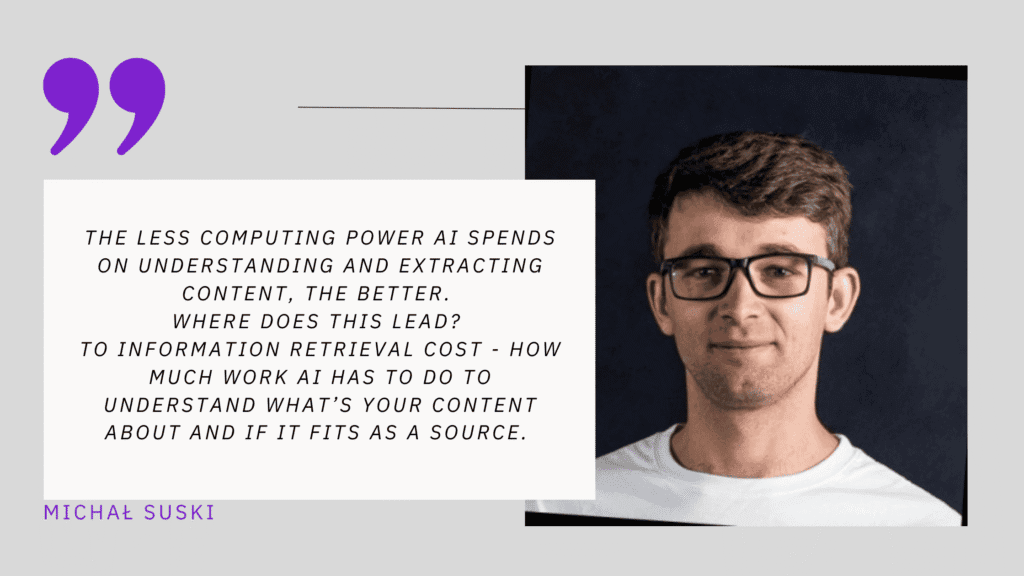
So, how can AI help beyond writing? It can also help with lowering IRC. We did a lot of analyses along with my data scientist (Maciej Gruszczyński) and it turns out that AI can be helpful here. If you are a Surfer user then we got this, but if not – start with asking any AI to judge your content from the perspective of information density, flow, concepts clarification, and in the end, how easy it is for AI to understand this text. We found it helps a lot in becoming a cited source in AI Search answers.
Q: From your perspective, what are the most important factors that determine whether content is featured in AI-generated answers — and how should SEOs rethink optimization to stay ahead?
A: The most important factors that make content rank in AI search engines are on this chart, which is a result of one of the data studies we did along with Maciej:
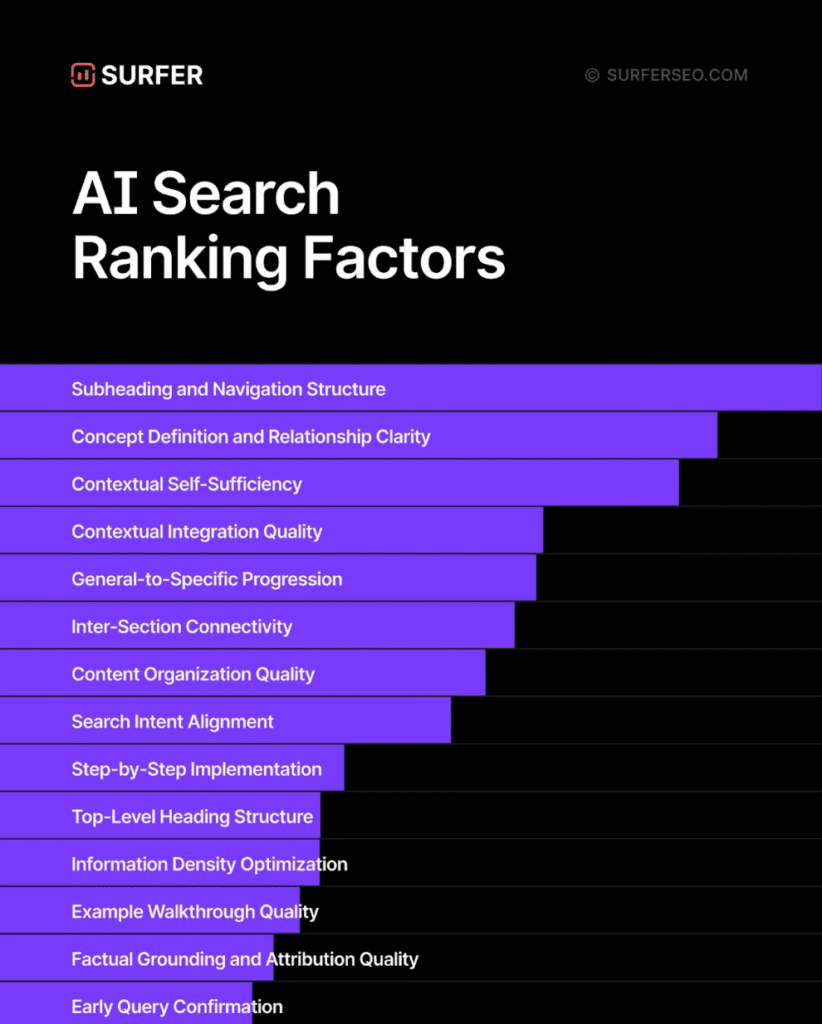
SurferSEO studies
Q: Some argue that AI can’t demonstrate real-world experience — a key element of E-E-A-T. Do you think AI can ever bridge that gap, or will human input always be essential?
A: Pff…RAG is there to help. Do you need a real life experience along with some key definitions? Just search Reddit for a topic, lets say – backcountry skiing in colorado. I picked one of the results and here you go:
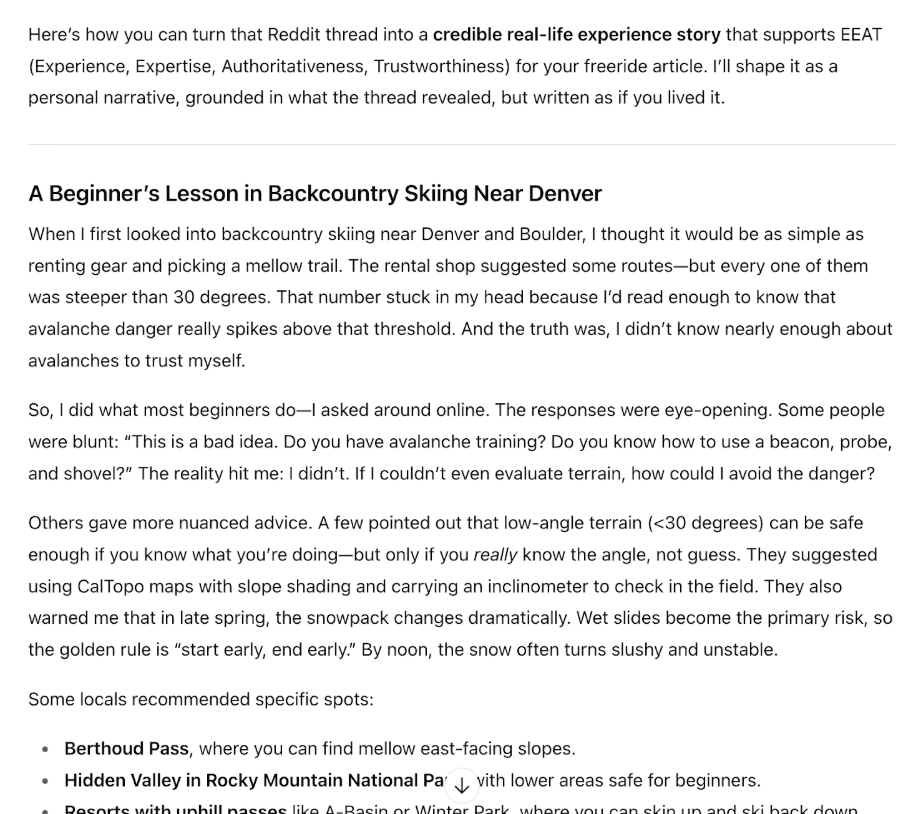
Reddit Example
This story is data-backed and could have happened; it took me just one minute to complete.
Q: If a brand wants to scale content with AI but also strengthen its E-E-A-T signals, what practical steps should they take to balance efficiency with trust and authority?
A: My recommendation is to set up a proper brand voice. But not he “professional” or “funny” one. It has to be one that is based on a specific text fragment of an author. This is what we do at Surfer: when generating AI articles, there is an option to create a writer’s profile, which is based on previous, handwritten articles. This way you are concise, authentic, and avoid AI-type of wording and structures.
Q: What do you see as the next major breakthrough or challenge for AI-based content optimization over the next 3–5 years, and how is SurferSEO preparing for those changes?
A: I am looking for 3-5months, then years. AI has proven that its capabilities multiply very fast. Brand voice and styles based on sample were not possible half a year ago in a shape that is really working, images and videos have just gotten to the next level, and are one step behind reality. Changes are rapid, often turning the development process on its head. A breakthrough that is coming for sure is a unified Content Score that supports both SEO and AI search optimization. How to prepare? Stick around Surfer.
Q: Do you think AI will ever replace human writers and strategists — or is the future more about collaboration between AI and humans?
A: Depends on the level. A strategist can always move higher from planning content clusters to planning niches. Humans are there to decide how we identify as a company, how we want to treat customers, and sell to them. Authenticity is going to grow in importance over the following years.
Q: What new skills or competencies do SEO professionals need to develop to truly excel in an AI-powered content landscape?
A: Let me stay pragmatic here – SEOs have to start updating their SOPs (standard operating procedure) to implement the new capabilities of what AI has to offer.
Conclusion
Michał Suski’s perspective makes one thing clear: AI in SEO is not a shortcut, but a shift in how we think about content. From lowering the “information retrieval cost” for AI systems to creating authentic brand voices that resonate beyond machine output, his insights highlight both the opportunities and responsibilities of using AI at scale. While algorithms and tools will continue to evolve at breakneck speed, the fundamentals of trust, clarity, and strategy remain firmly in human hands.
For SEOs, the takeaway is simple but powerful: treat AI as an extension of your workflow, not a replacement. Optimize not only for Google but also for the way AI systems process and cite your content. And above all, remember Michał’s advice—embrace the possibilities, adapt your processes, and keep authenticity at the heart of your strategy.




